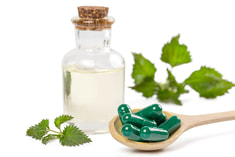|
A well-balanced diet can help you stay healthy during and after treatment. It can also help you keep your energy up during chemotherapy and radiation.
Young adults with breast cancer—like all adults—should eat a diet high in fruits and vegetables and low in fat. It's unclear whether eating a certain amount of fruits and vegetables can reduce your cancer risk. It is clear that fruits and vegetables are good for you in general. You should also be sure to eat healthy (complex) carbohydrates, rather than less healthy (simple) ones. Complex carbs include whole-wheat pasta, brown rice, and legumes like black beans and lentils. Simple carbs include things like cakes, pies, cookies, white rice, and pasta. Along with regular exercise, eating well can help you reach and stay at a healthy weight. In addition, young adults with breast cancer should pay special attention to several specific types of food and drink. Soy

Soy-based products (e.g., soy milk and tofu) are a good source of protein but they contain isoflavones. These substances affect the body like a weak dose of estrogen. High levels of estrogen have been linked to increased breast cancer risk. Some studies suggest that high doses of soy can increase the growth of breast cancer cells. Others suggest that soy products may inhibit it. Research is limited on the subject. It is not clear whether or not the amount of soy a person might eat in a day can cause breast cancer to grow.
The current recommendation is that it's probably okay to eat or drink soy products in moderation. However, you should avoid high amounts of soy isoflavone, including supplements such as concentrated pills or powders. Vitamin D and Calcium

Studies show that adults with breast cancer often have low levels of vitamin D, and researchers are studying why. Low vitamin D levels can contribute to bone thinning and osteoporosis, a disease that causes fragile bones. Some early studies suggest that low vitamin D may also contribute to breast cancer risk.
People should take a vitamin D supplement, but there is disagreement about how much. Current guidelines recommend 400 IU (International Units) to 1,000 IU per day. Most over-the-counter multivitamins contain this range, but you should talk with your doctor about what's right for you. You should also be sure to get the recommended amount of calcium (ideally in your diet, rather than supplements), because it helps your body process vitamin D. Before menopause, individuals should get 1,000 mg of calcium per day. After menopause, they should get 1,500 mg per day. Alcohol

If you drink alcohol, do so in moderation. Drinking alcohol seems to increase a person's risk of breast cancer, but no one is sure why. Some researchers believe that those who drink a lot of alcohol may have high levels of estrogen in their blood, and high estrogen levels have been linked to increased breast cancer risk.
Studies have explored whether those who drink alcohol after breast cancer have a higher risk of cancer recurrence (cancer coming back in the breast or in other parts of the body). However, the results have been inconsistent. Most studies do not show a clear link between drinking alcohol and breast cancer recurrence. However, we still have a lot to learn about the subject. A piece of conflicting information about alcohol is that young adults with breast cancer sometimes go through early menopause, which may raise their risk of heart disease slightly. Alcohol has been shown to protect against heart disease. Given these competing risks, you should only drink alcohol in moderation (if you drink it at all). On average this means having no more than 1 serving of wine, or the equivalent, per day. A full serving of alcohol is 12 ounces of beer, five ounces of wine, or 1.5 ounces of hard liquor. If you drink alcohol, getting enough of the vitamin folic acid (also called folate) in your diet may help offset the potentially increased risk of breast cancer associated with alcohol use. The recommended daily allowance of folate is 400 mcg (micrograms) per day. Remember, there is no substitute for your doctor's input. Always check with your healthcare provider to make sure these general recommendations are right for you. For more nutrition information, visit Dana-Farber’s Nutrition Services. Here you will find recipes, nutrition tips and articles, and a video series about eating well during cancer. Read a Dana-Farber teaching sheet about nutrition. |
Learn More:
|
|
|
|
Integrative Nutrition and Cancer: Get Answers to Your Questions
Dana-Farber nutritionist Stephanie Meyers, MS, RDN, shares research-based information about integrative nutrition and cancer, including the benefits of vitamin-D3, turmeric, and omega-3 fatty acids. |
Breast Cancer and Nutrition: Creating a Healthy and Happy Relationship with Food
In this webcast, Em Biever, MS, RD, LDN, an oncology dietitian at Dana-Farber, discusses evidence-based recommendations for making nutrition choices that will empower you during and after treatment. With so much misleading information out there, it is quite common for there to be stress and fear around eating after a breast cancer diagnosis. |
©2020 Young and Strong Progam at Dana-Farber Cancer Institute
